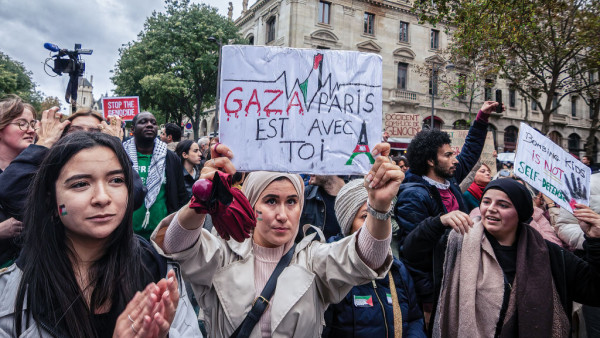Ghassan Abu Sittah, a British-Palestinian doctor who has repeatedly visited Gaza to perform reconstructive surgeries on victims of Israel’s war, was refused entry to France when he landed at Charles de Gaulle airport on May 4. It turned out that he wasn’t allowed to enter any EU country due to a Schengen-wide restriction imposed by Germany.
This silencing of a Palestinian advocate was externally imposed on France. However, within the republic, pro-Palestinian activists, politicians, and journalists face what French civil liberties and human rights NGOs have referred to as an “attack on the fundamental freedoms that are the basis of a democratic society.”
In recent weeks, trade unionists, activists, and politicians have been summoned by the counter-terror police over alleged terrorism apologia for pro-Palestinian social media posts. These summonses have been harshly criticized by French civil liberties NGOs such as the Human Rights League.
The League signed a letter arguing that removing terrorism apologia from the legal right to free speech in France in 2014 “reveals today its real function: avoiding the protections of free thought established over more than a century of republican debates, and disregarding the requirements of the European Convention for the Protection of Human Rights and Fundamental Freedoms.”
Beyond the debate on restrictions on free speech, particularly concerning advocacy for the Palestinian cause, a discussion has emerged around the role of the Israel lobby in French society.
Rima Hassan, a Franco-Palestinian activist and EU elections candidate for the left-wing La France Insoumise party, was summoned on April 22 by counter-terror police for investigation into “terrorism apologia.”
At the time of her interview with The New Arab, she did not know which statements were under scrutiny. She claimed it was not the prosecutor who initiated the investigation but a pro-Israel lobby group called Organisation Juive Européen (OJE) which filed “and then celebrated a successful complaint.”
Hassan remarked, “All states practice lobbying, but this is the strategy of a state that is losing the battle of opinion.”
OJE is an organisation purportedly existing to combat “antisemitism in all its forms,” including both anti-Zionism and the BDS movement, according to its website. Its president, Muriel Ouaknine-Melki, is a vocal proponent of Israel’s war on Gaza, has previously met with Israeli President Isaac Herzog, and recently met with the Israeli ambassador to France.
Targeting pro-Palestinian voices
The “celebration” Hassan referred to was a tweet from the organisation stating, “Good news! The complaints we have filed since October 9 are being investigated and often result in convictions.”
Hassan has been regularly attacked by pro-Israel factions in French politics. A conference on Palestine she was due to host with Jean-Luc Mélenchon at Lille University in March was cancelled by the university under pressure from Macronists and the far-right.
It was then banned by the local administration when rescheduled to a private venue. Hassan believes she is a target because she is a Palestinian political candidate.
She told The New Arab, “For months I have been sent death threats, rape threats, photos of the corpses of Palestinians, and it has become even more aggravated since the summons. They are doing this because I’m a political candidate and they are very scared by the perspective that I represent.”
Shortly after Hassan’s summons, Mathilde Panot, the leader of the La France Insoumise (LFI) parliamentary group, was summoned by police over terrorism apologia. Her summons related to a communiqué issued on October 7 which read, “The armed offensive by Palestinian forces led by Hamas comes in a context of intensification of the Israeli occupation policy in Gaza, the West Bank, and East Jerusalem. We deplore the Israeli and Palestinian deaths. Our thoughts are with all the victims. The current escalation risks leading to a cycle of hellish violence.”
LFI responded to Panot’s summons by accusing OJE of lobbying for the summons. Manuel Bompard, an MP for LFI, tweeted that OJE was “acting in service to the Netanyahu government.”
Legal actions targeting high-profile figures
The fact that these summonses have targeted influential individuals suggests a possible campaign of lawfare against pro-Palestine activists. When prominent trade unionist and spokesperson for the Revolution Permanente group Anasse Kazib was summoned, the Association of French Jewish Youths tweeted, “This was just the start Anasse Kazib, we always keep our promises.”
Other areas of French public life also face restrictions on advocating for the Palestinian cause. Comedian and radio host Guillaume Meurice was recently suspended from France Inter for making jokes about Netanyahu, and students at universities such as Sciences Po and the Sorbonne have faced threats of disciplinary action, arrests, police violence, and teargas in response to their protests.
Ismael Yaqoob, one of the organisers with the Comité Palestinien at Sciences Po Paris, told The New Arab that the current situation “is unprecedented in recent history. It’s like scenes from 1968 with the way the police are being used; none of the encampments survive 24 hours before the police are sent in, and it is 100% targeting Palestine advocacy.”
Yaqoob added, “There is a high level of targeting and racial profiling. It’s completely arbitrary the way they do it. They just pick people. They are also playing off the fact that lots of people are immigrants with visa situations that can be flagged if they are picked up by the police. It’s an intimidation tactic. It’s very scary for free speech. We have already seen that the political climate in France has been very messed up for a while. Very racist and Islamophobic and this is part of that same hostile culture.”
OJE, the Paris counter-terror court and the Paris police were all contacted but did not respond to The New Arab’s questions.
Olly Haynes is a journalist covering politics, protest, the environment, and culture
Follow him on X: @reality_manager


